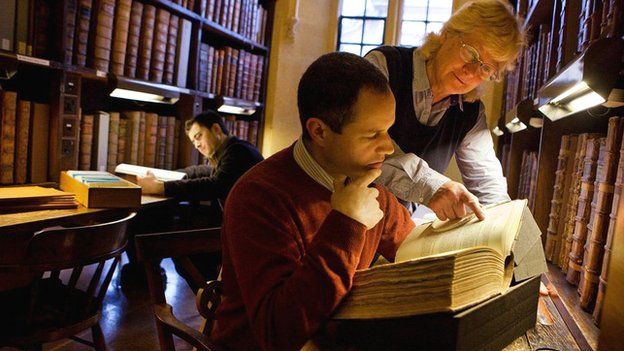Dictionary reaches final definition after century
- Published

A dictionary has finally been completed after more than a century of accumulating entries.
The 17-volume dictionary of medieval Latin, launched in 1913, has reached its final definition, "zythum", a type of fermented malt drink.
The editor, Richard Ashdowne, from Oxford University's classics faculty, said such a laborious, long-term project would never be initiated now.
"Some people really did doubt we would ever reach the end," said Dr Ashdowne.
The project began when Oxford historian Robert Whitwell wrote a letter to The Times calling for volunteers to help with researching this dictionary.
Mr Whitwell's plan was to produce the medieval Latin equivalent of the Oxford English Dictionary.
After 101 years, The Dictionary of Medieval Latin from British Sources will formally close in September.
It will fill an academic gap that Mr Whitwell had identified before the First World War.
Latin had been the language of written records for medieval courts, religion, science and politics. But scholars looking at Latin documents from Britain were still having to depend on a reference book first published in the 17th Century.
Amateur historians
Dr Ashdowne says that was a different world of scholarship, and many of the experts called upon to help were independent amateurs rather than professional academics in universities.
This early form of crowdsourcing depended on a diverse band of volunteers, including a retired clergyman, a First World War hero and a colonial district commissioner in Burma, who was reputed to have carried out his studies while riding on the back of an elephant.
Compiling the Latin dictionary has also given glimpses of life in the medieval era.
In establishing the Latin word for "muzzle", there was a record from 1252 showing that a muzzle had to be made for a polar bear, kept in the Tower of London, which had to be restrained when it was brought to fish in the river Thames.
The word for chimney - "caminus" - was sourced from a description of an earthquake which hit England in the 1340s which toppled chimneys.
There were also strange tales from coroner's courts, such as an account of a cat chasing a mouse down a well and then a woman drowning when she tried to rescue the cat.
Technology
Dr Ashdowne is the third editor - joining the project in 2008 when the dictionary had only reached the letter S.
He says there was a "huge feeling of satisfaction" when the dictionary was completed, but also a keen awareness of the many people who have contributed.
Such an epic project would be unlikely to be attempted now, he says, not least because the funding of academic projects is much shorter-term.
The completion of the dictionary had been accelerated by the arrival of computer technology, says Dr Ashdowne.
Dictionary entries were initially painstakingly assembled using handwritten slips. The printing process was also much slower before the arrival of computers. Researchers are also able to search source materials much more quickly, when documents have been digitised.
There are 750,000 slips, with more than 100,000 different senses of words and more than 400,000 quotations, with the final edition stretching to almost 4,000 pages.
There are also plans for the dictionary, published by the British Academy and costing £660, to be produced in a digital form.